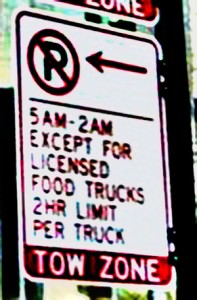 CHICAGO, IL – After almost two difficult years of operating her food truck, DuckNRoll, Amy Le shut it down and opened Saucy Porka, an Asian-Latin fusion restaurant in the South Loop. She said the city of Chicago’s onerous rules surrounding food trucks were partly to blame.
CHICAGO, IL – After almost two difficult years of operating her food truck, DuckNRoll, Amy Le shut it down and opened Saucy Porka, an Asian-Latin fusion restaurant in the South Loop. She said the city of Chicago’s onerous rules surrounding food trucks were partly to blame.
“Sometimes I wish somebody would have told me the reality, then I would have thought twice about it,” Le said. “I was one of the most popular food trucks. We were not making a profit for the first four to five months, and we were at every event.”
The foodie culture surrounding gourmet food trucks in Chicago and elsewhere has been a draw for trained chefs who aspire to start their own businesses and for customers who can sample up-and-coming cuisine.
“It’s nearby and the food is delicious,” said Khalil Wehbi, while waiting in line at the Fat Shallot food truck at lunchtime in the Loop. “The truffle fries are incredible, so I’m here to get more of those.” The Fat Shallot’s chef, Sam Barron, has worked as a chef for the past decade, including eateries in Spain and New Orleans, and hopes to open his own restaurant.
But despite its thriving foodie culture, Chicago is behind other cities in the gourmet food truck industry.
Of the 120 gourmet food trucks in Chicago, according to the city, 20 are licensed to cook on-board. By comparison, Cleveland has 49 trucks licensed to cook on-board. Indianapolis, a much smaller city, has a total of 90 licensed food trucks. Los Angeles, with its warm year-round climate, has more than 250 licensed food trucks.
In Chicago, strict conditions for mobile food vendors impede growth, Le said, such as a two-hour service limit in one designated spot, parking at least 200 feet away from any brick-and-mortar restaurants and installing a GPS tracking device.
“Chicago is a tough city to operate a food truck,” Le said. “Even though the city passed the ordinance last July for on-board cooking, it was not an ordinance that would change the landscape of the food truck business.”
For one thing, Chicago food trucks that cook on on-board are prohibited from holding more than 40 pounds of propane in the vehicle.
“For a food truck, 40 pounds is not enough,” Sarah Weitz, co-owner of the Fat Shallot, said. “Unfortunately, when it’s cold outside, propane doesn’t vaporize as quickly and our tanks freeze. Instead of changing my propane tank every two services, I have to change it every service.”
Find the entire article by Michelle Kim at medill.northwestern.edu <here>



